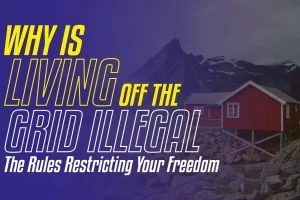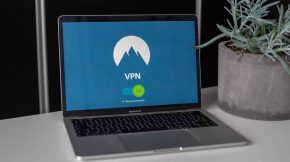Why Is Living Off The Grid Illegal: The Rules Restricting Your Freedom
Share
Living off the grid is a thing now. It is a lifestyle choice that has been picking up steam for a while now. People have been going off the grid in many ways, from living in yurts to RVs and log cabins.
Although some towns may be more open to the idea of going off-grid, overall, this lifestyle is considered illegal in most counties.
In this article, we’re going to examine the common reasons why living off-grid is illegal, why people do it, how they do it and how you can get around these constraints and still live off-grid if you so desire.
Why Is Living Off The Grid Illegal?
Living off the grid is not illegal, but some restrictions and regulations might make it illegal in some places or limit the practice to the extent that it becomes illegal.
These regulations include zoning restrictions on houses and square footage, water disconnection, selling food from your garden, and installing the septic system.
What Is Off The Grid Living?
Off-the-grid living is all about making your life simpler while also being more self-sufficient.
Off-the-grid living is a lifestyle choice that can also be achieved as an alternative to poverty. It is considered off-the-grid if a residence is not connected to the local municipal water, power grid, and waste disposal that modern cities rely on.
Hence, off-the-gridders do not have regular access to electricity and water. Many of them live in self-sufficient homes, even though they aren’t necessarily self-sustainable.
Living off the grid has been practiced worldwide for centuries, but it seems to have gained popularity recently.
Most people who choose this lifestyle are from developed countries, where they want to move away from the fast-paced city life.
Why Live Off The Grid?
When you think of living off the grid, do you think of a mountain man in a cabin out in the woods or of a hermit living in the middle of nowhere?
Many people cringe at the idea of living off the grid because they don’t see how anyone could survive without running water and electricity.
The truth is that there are many reasons why someone would decide to live off the grid. Here are five reasons why living off-grid is a smart and sustainable choice.
1. Get Off The Grid For Your Sanity
It’s great for your sanity. It’s hard to hear yourself think when living in a city with millions of people. You don’t have that noise when living off the grid. If you go completely off the grid, you can also enjoy all the peace and quiet nature has to offer.
2. Save Money On Energy Bills
Each year a typical household spends a significant sum of money on energy bills. The average US household uses more energy than what is needed.
When you live off the grid, you get to learn the meaning of true sustainability. Instead of relying on big companies to provide your energy and water needs, you have to get creative with your energy sources and water usage.
In this way, you cut down electric bills, water, gas, heating, internet and phone bills, garbage disposal, and sewerage charges.
You also don’t pay rent, so that’s a plus, not forgetting all the transportation charges and restaurant bills.
3. Live In A Greener Environment
People often think that a “green” lifestyle is a choice made by a select few-like going to a farmers’ market instead of the grocery store or using a reusable water bottle to cut down on plastic waste.
There are many environmental benefits of living off the grid, and anyone can achieve them. You produce your power and water to live in an eco-friendly way. You also reduce your carbon footprints.
4. Improve Your Health & Wellness
One of the strongest reasons to live off the grid is for your health and wellness. Cell phones, Wi-Fi, and other electromagnetic waves have been shown to cause cancer. Don’t fall for the lie that there is no evidence. There is evidence, and it will only get worse as more people use cell phones.
If you believe you can reduce or eliminate your exposure to unhealthy radiation levels, then consider living off the grid as an option. Either way, you need to do something about it, and living off the grid is a great first step.
In any case, the fresh unpolluted air you get to breathe every day, in the countryside, should be more than reason enough.
5. Live A Simpler Life Off-Grid
The idea of being completely disconnected from society is an attractive one, and many are willing to make several sacrifices to achieve it.
Why Is Off The Grid Living Illegal?
Living off the grid is not illegal, but there are some reasons why it might be illegal to do so in some places.
1. You Aren’t Allowed To Camp On Your Land
Living off the grid can be illegal if you aren’t allowed to live on your property. Camping with the best tents for rain for more than two weeks requires a permit from the city, and they make it hard to get. The reason that they want to reduce homelessness which reduces the value of the surrounding properties.
2. If You Live On Public Property
If you’re building your off-the-grid home on public property, like a national park or government land, then it’s illegal to live there unless you get express permission from the land’s owner.
In National parks and preserves, residents are not allowed without special permission from the government, and they could even be removed if they don’t comply with rules and regulations.
3. Minimum Square Footage For Your Home
Most homes have a minimum requirement of about 500 to 1000 square footage, and you must meet this requirement, so that means that you want to build a house between 400 to 800 square footage, it’s not possible.
The house also has to meet international building codes, and if it doesn’t, it becomes illegal. There is a way of getting around this by applying for a variance from the city council so that you can get smaller building quotes than the required minimum.
4. Minimum Lot Size
In most cities, lot sizes are small, about 5000 square footages, but as you move away from the city, the minimum lot sizes get larger to 5 to 10 acres minimum.
In some cases, you find the minimum lot size to be 20 to 40 acres, so that means if you want to parcel out the land, you can’t do that.
If you do get the permit, you also have to install water, electricity, sewerage, and get the right documentation for the smaller lot sizes that you parcelled out, which becomes costly in the long run.
5. Water Disconnection
There must always be water on your property at all times; if not, then it becomes illegal. Rainwater is not permitted for usage as it could have chemicals that come from the roofing. You could dig a well as many people often do.
In some counties, water disconnection from the municipality is not allowed, and, in some cases, they require you to connect to their main water source, so that would cost you large fees, which could cost up to 15K USD and that is quite expensive.
6. Power Systems
In many cities, it is illegal to disconnect from the main power source. However, in rural areas, you can use solar panels to generate electricity to power your home.
In some cases, the county or the City Council will pay you to supply the surplus electricity, which could help offset the electric bills.
7. Septic Systems
You just can’t dump anywhere, both literally and figuratively. Human waste must be disposed of properly, and if not, you violate the health code.
There are minimum sizes for the septic systems. The ground must be tested (perc test), which is used to determine the absorption rates of the soil.
Once those results are submitted to the City Council, you can install the septic system, which you cannot do yourself.
You have to get a licensed contractor to install it; if you do so yourself, you violate the regulations and become illegal.
8. Livestock Rearing
In most rural areas, livestock rearing is allowed, but, in some cases, you would need to have to get the permits from the county.
Areas close to the city most definitely have restrictions on livestock keeping, so you have to get a permit from the city; if you don’t, you violate the law.
9. Selling Of Food From Your Own Garden
It is illegal to sell food from your home or produce from your farm unless you have a permit and a certificate from the health inspectors.
Conclusion
While off-the-grid living may seem like an ideal way to live, it’s important to note that there are laws in place designed to protect you and your property.
But, if you do choose to live off the grid, make sure you know what city ordinances you need to comply with so that you can avoid fines or even criminal charges.

















